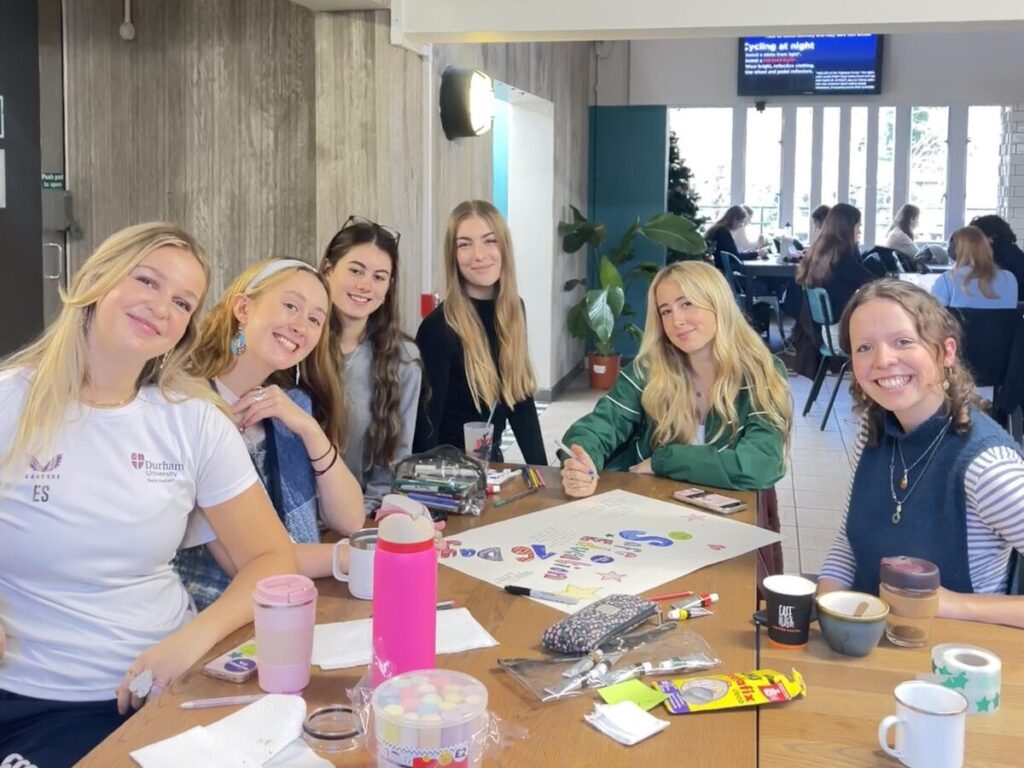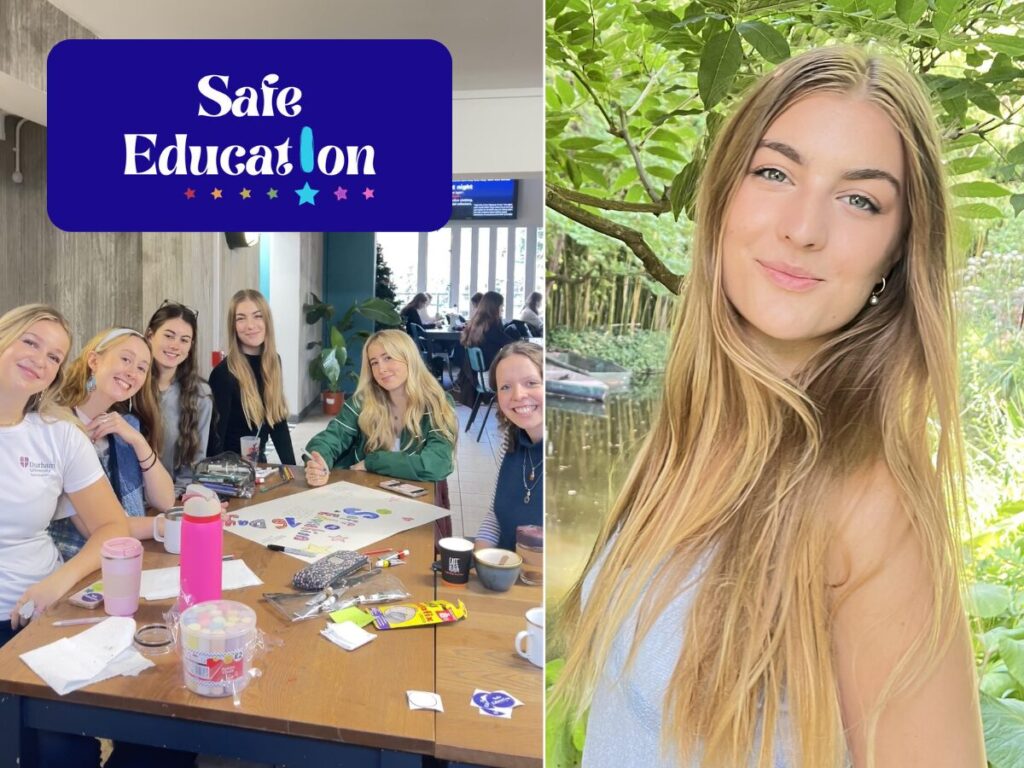TW: Mention of SA
When I called Oliwia Charowska, the founder of Safe Education, it was another Saturday morning at university for both of us. She’s in Durham and I’m in Cambridge. As we began the interview, I felt an affinity for the topic. The casual prevalence of sexual harassment in universities. It reminded me of a conversation I had many times with a female friend. We’d have a debriefing session the night before, and someone would say, “That guy at the club was really weird to me last night,” or “I felt really unsafe walking home.” They’ll say things like, “They didn’t leave me alone.” Usually veiled in euphemistic language and hushed tones, we quietly reveal our experiences of verbal and sometimes physical violence, counsel each other, and move on with our days.
This normalization of sexual violence is what Safe Education is fighting against. And this time, the conversation with Oliwia was different. Safe Education has a practical plan to address high levels of sexual assault and rape culture on college campuses. A student-led campaign based at Durham University, they have already worked with Equal Rights, Amnesty International, the University of Edinburgh and now The New Feminists to spread awareness and share practical solutions. , making college campuses safer for everyone. As they state in their open letter, “Safety on campus is a minimum, not a luxury or a privilege. Safety is a minimum.” It is a right. ”Here’s what we learned.
Maddie: How normalized is sexual violence in UK universities and how does it manifest itself?
Oliwia: There are so many different layers that need to be unpacked. I speak as a young woman, and in my experience, a culture of sexual violence is ingrained in my college experience. One of the things Safe Education wants is for universities to recognize the intersectionality of sexual violence. All forms of harassment, including racism, classism, and homophobia, amplify the effects of sexual violence and normalize it. If you are already biased against one group, you are much more likely to devalue or dehumanize another group, such as women.
Another form of normalization occurs through a lack of consent training. Due to the current lack of a statutory duty of care in universities, the level of consent training varies widely between universities. This means there is a clear lack of organizational accountability. A recent Platinum interview revealed that more than a third of students do not take Durham’s required training. What does this say about how seriously this issue is taken and how enforced consent education is in practice?
Students are more likely to be assaulted in college than in any other profession. Universities are multi-million pound institutions and we are talking about tackling sexual violence, which is a human rights issue. These are the right to feel safe, the right to bodily autonomy, and the right to dignity. This is why we are lobbying the government to redefine universities’ statutory duty of care. This type of negligence is legal in any other institution, workplace, hospital, or school.
Therefore, the collection of data on this issue has ceased as there is no legal obligation for universities to address this issue. A recent BBC survey revealed that fewer than half of UK universities can provide up-to-date statistics on sexual violence. We are in a situation where sexual violence has become so normalized that we have stopped counting.


M: What is the “red zone”? Why is it important? How does it highlight the importance of a lack of consent education?
O: The red zone is the first semester of university. This period is called the red zone because it is when students, especially freshmen, are most vulnerable to assault. The Red Zone therefore emphasizes the importance of the first step of our proposed solution: proactive and proactive consent training. For many survivors, it’s too late even a few weeks into the school year. Two-thirds of students at UK universities have experienced sexual violence, with much of it occurring during this dangerous time. Students are away from home, do not yet have established support networks, and are extremely vulnerable.
M: The idea of the red zone resonates with me. In college, our friends do emotional labor without institutional support, trying to talk to us about issues for which they are not qualified. What’s the best way to address prevention and systemic support for students in the future? Let’s start with a change in attitude.
We have to stop double standards. Alcohol consumption becomes a double weapon for blaming the victim for their own assault and making excuses for the perpetrator. Even though we are told not to ask people what they were wearing or what they were drinking, this word is still prevalent. The only way to challenge it is through bottom-up education.
At Safe Education, we also continually educate ourselves. I’m learning something new every day. When approaching these issues, we need to approach them with curiosity and empathy. Education is not about catching people, it is about learning and growing together, so that sexual violence is not the norm and that society is willing to challenge, speak up and be part of the solution. will be reachable.
Some of the behavioral changes we should focus on are the simple acts of believing in survivors. We should empower each other by showing that there is no shame or blame, and that it is the system that needs to change. I love Laura Bates’ phrase, “Fix the system, not the woman.” As a society, we must shift our mindset to look for better systems, not women themselves.
M: There is only so much we can do as individuals. What systemic changes should we see to keep us safe?
O: Here are some examples of open letters we are currently working on:
Mandatory consent education that is actively conducted and monitored, including “active bystander training.” A survivor-centered intensive support system to combat sexual violence. One Advocate System for Survivors: One staff member supports survivors and acts as their advocate and liaison, supporting their rights and providing information. Clear Signage and Accountability List: Universities must have a clear policy on sexual violence that comprehensively defines misconduct and disciplinary actions. And finally, we need a change in government. Statutory duties of care hold universities to greater accountability. Continued collection of data on this issue is also important for accountability.
Working in the feminist field can sometimes feel quite dark. As I read article after article about new cases of sexual violence, I wonder how we, as individuals, can begin to address these systemic problems. Conversing with Oliwia was a breath of fresh air. A simple truth stuck with me: safety, dignity, and bodily autonomy are human rights. Sexual violence has become so commonplace that we forget to hold our institutions accountable. Safe Education reminded me why I started working in this field. Simply building a community that cares deeply about the issues and dares to demand better for themselves and each other is enough to make a tangible difference.
You can follow Oliwia Charowska’s work and Safe Education @safe_education_du.



